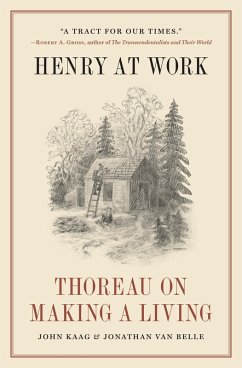What Thoreau can teach us about working-why we do it, what it does to us, and how we can make it more meaningful
Henry at Work invites readers to rethink how we work today by exploring an aspect of Henry David Thoreau that has often been overlooked: Thoreau the worker. John Kaag and Jonathan van Belle overturn the popular misconception of Thoreau as a navel-gazing recluse who was scornful of work and other mundanities. In fact, Thoreau worked hard-surveying land, running his family's pencil-making business, writing, lecturing, and building his cabin at Walden Pond-and thought intensely about work in its many dimensions. And his ideas about work have much to teach us in an age of remote work and automation, when many people are reconsidering what kind of working lives they want to have.
Through Thoreau, readers will discover a philosophy of work in the office, factory, lumber mill, and grocery store, and reflect on the rhythms of the workday, the joys and risks of resigning oneself to work, the dubious promises of labor-saving technology, and that most vital and eternal of philosophical questions, "How much do I get paid?" In ten chapters, including "Manual Work," "Machine Work," and "Meaningless Work," this personal, urgent, practical, and compassionate book introduces readers to their new favorite coworker: Henry David Thoreau.
Henry at Work invites readers to rethink how we work today by exploring an aspect of Henry David Thoreau that has often been overlooked: Thoreau the worker. John Kaag and Jonathan van Belle overturn the popular misconception of Thoreau as a navel-gazing recluse who was scornful of work and other mundanities. In fact, Thoreau worked hard-surveying land, running his family's pencil-making business, writing, lecturing, and building his cabin at Walden Pond-and thought intensely about work in its many dimensions. And his ideas about work have much to teach us in an age of remote work and automation, when many people are reconsidering what kind of working lives they want to have.
Through Thoreau, readers will discover a philosophy of work in the office, factory, lumber mill, and grocery store, and reflect on the rhythms of the workday, the joys and risks of resigning oneself to work, the dubious promises of labor-saving technology, and that most vital and eternal of philosophical questions, "How much do I get paid?" In ten chapters, including "Manual Work," "Machine Work," and "Meaningless Work," this personal, urgent, practical, and compassionate book introduces readers to their new favorite coworker: Henry David Thoreau.
Dieser Download kann aus rechtlichen Gründen nur mit Rechnungsadresse in A, D ausgeliefert werden.


